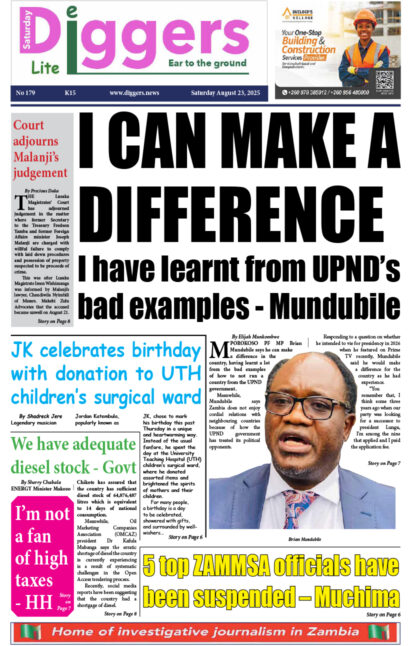Democracy recognises that the voices of the marginalised in society matter; and therefore that the representation of those voices also matters. With the presentation of the Constitution Amendment Bill No. 10 of 2019 or Bill 10 as it became known, debates and discussions took centre stage on the issue of the need for greater representation of women, youth and the disabled in national leadership advanced as a reason to support the Bill. Some sectors of society argued that Bill 10 was the only hope for certain groups to pull through the barriers that hindered women, youth, and disabled persons’ participation in elections as candidates, citing campaign resources as a major barrier. The defeat of Bill 10 is now being used as an argument as to why women, youth, and disabled persons are not being adopted by political parties. This argument is disingenuous.
What Bill 10 proposed was a mixed member electoral system which was not defined as advancing equitable gender representation or fair representation of interest groups in the Bill or in the proposed amendment to the Electoral Process Act. Article 45 (1) (c) and (d) of the current Constitution already addresses the gender equity and fair representation of various interest groups in the National Assembly and in Councils. The Article provides that the electoral system provided for in Article 47, which is a first-past-the-post for the election of members of parliament or councillors, shall ensure equitable representation of various interest groups in society and gender equality in the National Assembly or Council.
According to 2019 World Bank figures, women make up 50.49% of the Zambian population; and according to 2016 UNFPA figures, young people aged 15-35 make up 36.7% of the population. These figures are not reflected when it comes to inclusion in the governance of the country. According to the Interparliamentary Union, since the 2016 elections, only 16.77% of parliamentary seats are taken up by women and only 35.98% of all parliamentary seats are taken up by people under the age of 45 years. This has given rise to activism and advocacy around promoting gender equality, youth, and disabled persons in governance at all levels of our governance structure.
The Constitutional reform that took place in 2016 through the Constitution of Zambia (Amendment) Act No.2 of 2016 Article 45, was a purposeful approach to tackling issues of gender inequality and marginalization of various interest groups in the governance of Zambia. This was done by way of setting mandatory principles and values that govern the electoral system in Zambia in Article 8 of the constitution including equality, non-discrimination, and national unity. These in turn compel political parties and the Electoral Commission of Zambia to make regulations and conditions that will ensure the requirements of the Constitution are met, derogation of which would make any policy, rule, practice, act, or omission seeking to derogate from the spirit of the Constitution regarding Zambia’s electoral system, null and void.
The Constitution of Zambia mirrors the desirable equitable representation of gender, youth, and disabled persons in the National Assembly and Councils. The strategic positioning of such constitutional provisions require political parties to ensure that the list of adopted candidates meets the constitutional standard of representation. They also impose a direct obligation on the Electoral Commission of Zambia to ensure that political parties as stakeholders in the implementation of Zambia’s electoral system comply with this requirement without fail.
Article 60 (2) (a) of the Constitution of Zambia (Amendment) Act No. 2 of 2016 provides that political parties shall promote the values and principles specified in the Constitution. It appears from Article 60 (2) (a) that there is a positive obligation in the 2016 Constitution requiring political parties to abide by and promote Constitutional values and principles that are specified in the Constitution, such as fair representation of various interest groups and gender equity in the Councils or National Assembly as a new feature to our electoral system in Zambia. It follows, that at the very least, political party final adoptions would have to meet this standard and send a list of candidates to the Electoral Commission of Zambia and their responsible party organs to check for conformity and compliance with Constitutional values and principles in our electoral system for the desirable composition of parliament and council chambers.
In conclusion, there cannot be a better time to implement the aspirations of the people of Zambia than this very time when political parties are finalizing their adoption processes and before filing of nominations with the Electoral Commission of Zambia is done. Representation in governance matters. We recommend, that responsible organs of political parties should, in their selection of candidates for representation in the Councils and National Assembly, ensure compliance with Article 45 (1) (c) and (d) of the Constitution. This would meet the aspirations of the Zambian people as to the composition of the National Assembly and Councils. We also recommend that the Electoral Commission of Zambia pay close attention and guide stakeholders on the provisions of the Constitution and the implication of the new features to our electoral system as specified in the 2016 Constitutional amendment, which is law and should be enforced.
Chapter One Foundation is a civil society organization that promotes and protects human rights, the rule of law, constitutionalism, and social justice.
























